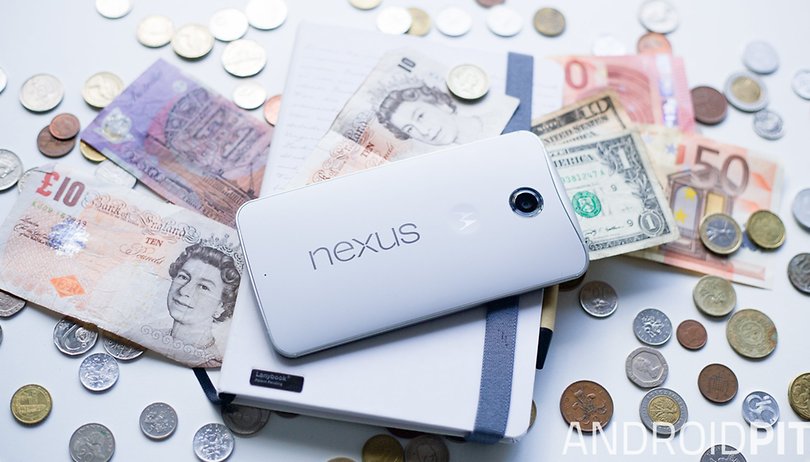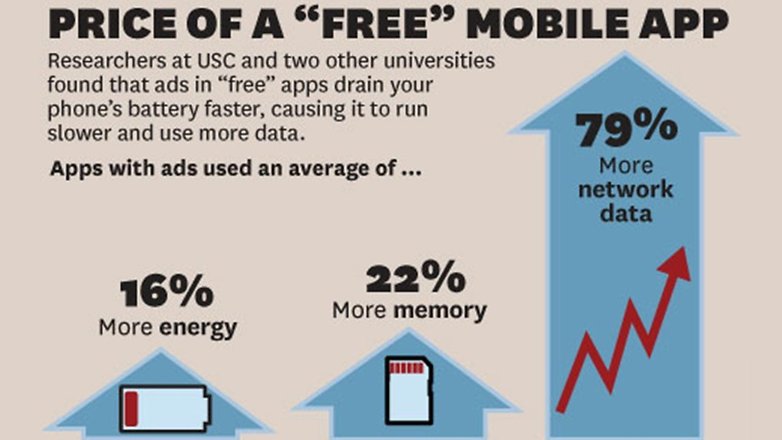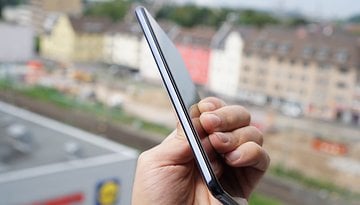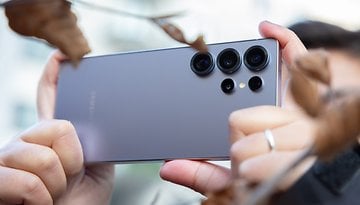What they don't tell you about free apps

We make no bones about it. We love anything that's free, there’s no surprise there. But is anything really for free these days? Lots of Android apps? Well, it seems not: a study has revealed the hidden costs behind free apps.
The majority of Play Store proceeds don’t come from paid apps. The income for the main developers comes from free apps. However, while we know the importance of in-app purchases, in this article, we’re interested in the hidden costs behind free apps.
There are other monetary costs that we’re seeing these days. Even those who don’t pay a single cent for a free app are paying in other ways, as revealed by a study carried out by the University of Southern California, Rochester Institute of Technology and Queen’s University.
The study compared 21 free apps that feature in a list of the most popular apps on the Play Store between January 2014 and August 2014 on a Galaxy S2. Mechanisms for the least disconcerting ones were also revealed.

The core of the problem is that, in general, free apps are financed by advertising. This seems legitimate but it can quickly create knock-on effects. Our aim, of course, isn’t to criticize the free app market, as we’re happy to use it. However, it’s important to be aware of the disadvantages and the risks that you take when using free apps.
Free apps eat up your battery, mobile data and they require access to your personal information: these are the hidden costs of free apps.
Free apps use up more battery
With advertising, free apps use up to 33% of your battery. The battery’s lifespan is also reduced by using these apps. Those who use a lot of free apps will see a difference in their daily battery usage.
Free apps slow the system down
It’s true that top-range smartphones have more powerful processors, but with daily usage, it’s these apps that have a profound effect, particularly because of multitasking.
Free apps supported by advertising use up to 56% of your processing power. 22% comes from memory usage and 48% from computational charge accumulated on the processor. The statistics speak for themselves, particularly when we consider that not everyone has a Galaxy S6 or some other top-range smartphone. Most people (especially the older generation) still have old models with just 1 or 2 GB of RAM.

Free apps use more mobile data
How does app advertising show up on your phone? Through transferring data, of course. According to researchers, the amount of data gained through free apps can be more than 100% of that gained from paid apps. But don’t worry: the average increase only reached 79%. Luckily!
In countries where most users have a 1 GB package, it really makes you wonder. But this amount of data is also calculable in cold hard cash.
According to major phone carriers such as AT&T, the average data consumption by free apps is 1.7 cents each time you use it.
- How to track your data usage on Android
Of course, we teach our users to be careful. It’s not about completely rejecting the idea of free apps. The developers need to be paid for their work. However, it’s important to bear these hidden costs in mind when you decide whether you want to invest in the full version of the app or in the in-app purchases. It’s normal to invest in apps, but you should know what it involves. Next time, think it through before you choose which version to download!




















"Free apps slow the system down"
Completely true.
Right on article.
I don't mind looking at an ad at app launch or in the settings, but can't stand the really big intrusive kind or the persistent boxes that interfere with the main activity screen. After a favorite app went goofy with ads a few months ago I went looking for system-wide ad blockers and found three that work sometimes. (Google is your friend.) One wouldn't work on Android J. I'll say again I wouldn't mind a respectful implementation of ads to support the dev, but many are like watching a movie on TV with a flashing popcorn ad on screen throughout - forget that.
The two that work on nearly all apps on my Android J, L, and M devices eliminate the little ad boxes (sometimes leaving a black space) and pop-ups, and empty out the ad boxes on browser pages - so I assume battery drain from ads is reduced. Both are developed by German white hat guys and somehow detect and reroute ad DNS requests to empty servers. Both are FOSS and not allowed in the Google Play Store - can be sideloaded as APKs from their own sites, GitHub and a few others - as usual it's prudent to scan with onboard security software during the sideload install.
Really interesting. Did you check battery consumption before and after? I imagine that not downloading the entire ad can actually save battery, but still pinging of servers keeps the antennae busy, which is also a major problem of juice (well, it exists of course in the non blocked ads!).
The app I use on my quick-draining Android M tablet generally takes an ad ping, then goodbye, I never see it. My battery life isn't radically improved because the few ad-supported apps I use are launched for a few minutes at a time - I'm not subscribed to major battery hog social media and popular apps - but it certainly isn't negatively affected. The blocker is very low resource. The main objective is not battery but the ad's distraction from happy app use - I'd only suggest try and see.
free apps ..?
read the app permissions before installing..
then if it has in app advertising,
after installing check out how much battery and ram the app uses.
then if you can or you care buy the pro version!
Agreed. Support the developer
Thanks for clarifying about "21 free apps that feature in a list of the most popular apps on the Play Store between January 2014 and August 2014 on a Galaxy S2".
Even though the conclusions might be similar today, 3 years passed, and many models of smartphones have been released, and statistical studies have been invented :-) Stretching out conclusions is typical of consulting firms and predatory journals. Are there other, better studies?
It is just like Paul d Scott said the other day. " if you are not paying for the product you are the product " . All those free apps make their money by selling your information.
free apps and data mining
it's a perfect match
like politics and fake news.